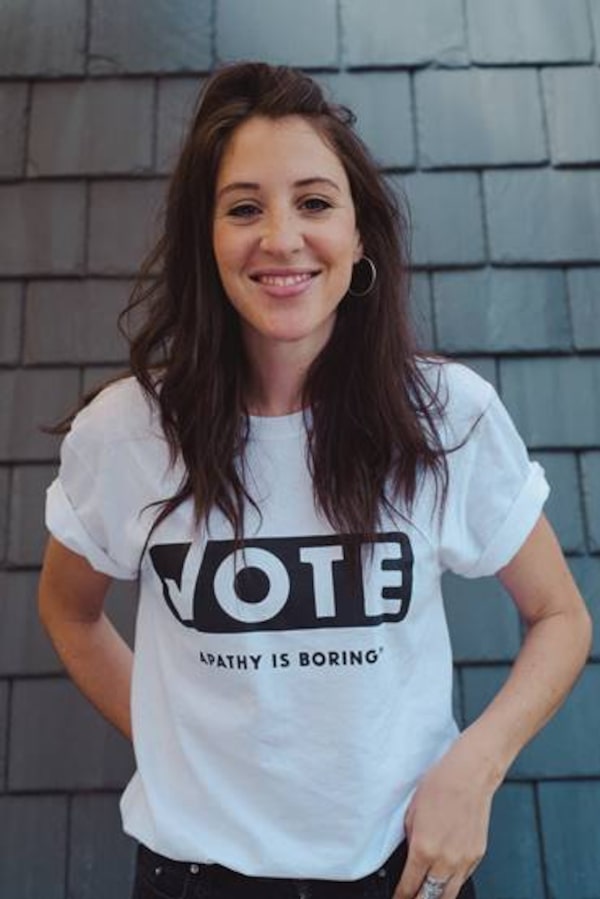
Caro Loutfi, executive director of Apathy is Boring
Caro Loutfi is the executive director of Apathy is Boring, a youth-led, non-partisan, charitable organization that educates youth about Canada’s democracy. She will be appearing at 6 Degrees Toronto.
Young Canadians care deeply about the issues that affect us, our families and our communities. And this year, for the first time, young Canadians between the ages of 18-38 will make up the largest group (33 per cent) of eligible voters on election day.
There has long been a sense that younger people don’t engage with civics, whether it’s casting a ballot on election day or engaging in dialogue with our elected representatives. But it’s not because we don’t care. We are increasingly showing up in informal civic spaces, such as protests and social-media movements. It’s a question of how we are choosing to be heard on the issue, and whether we see ourselves reflected in formal civic spaces.
Think of the election as a high-stakes house party that’s being hosted by all the major political parties. While most older Canadians are getting personal phone calls and invitations, the majority of young Canadians are not being asked or expected to show up. Not only that, but if they do show up, not many people at the party look like them or have their lived experiences. And you wonder why it’s so hard to get us to the party? Older generations have a critical role to play in this work, particularly in combating negative stereotypes that discourage participation.
It’s a reality that young Canadians often don’t see ourselves in the priorities of elected officials, institutions or policies. We are not a monolithic group. There are more than seven million individuals with different values and interests represented. A young person living in rural Alberta likely has different priorities than a young person in a remote part of Nunavut or in an urban centre in Ontario. And yes, while there are some overarching issues that young people care about, such as the economy and the environment, the proposed solutions for ways forward on how to grow the economy, increase the quality of life of all our citizens and tackle climate change, differ among youth just like they do among Gen Xers and Baby Boomers. The problem with thinking we’re all the same is that large segments of the youth population get ignored.
When older generations, the media and politicians think we don’t care, parties and candidates don’t prioritize us, but instead focus on engaging the existing voter and the concerns that they raise. It contributes to our lack of trust and detracts from our sense of belonging to our communities. Yet youth engagement is not only critical for democracy itself – if these participatory habits aren’t formed, over time the core practices of our democracy degrade – but it’s essential for our democracy to respond to the diverse realities of youth today.
Since the 1970s, youth voter turnout had been declining steadily, with only 38.8 per cent of young voters (18-24 years old) participating in the 2011 federal election. Yet, in 2015, 57 per cent of young voters cast a ballot – a jump of 18 points from the previous election. We must continue this trend.
But this is where the work lies. We need to support youth by building a bridge between the issues they care about, and the impact government has on those issues, as well as build trust among youth and our elected officials.
I was 23 years old, waitressing and finishing my undergraduate degree, when I took on a paid summer internship at Apathy is Boring, a youth-led non-partisan organization that educates youth to be active citizens in Canada’s democracy. Fifteen months later, I took on the leadership of this national non-profit, with the goal of engaging youth in Canada’s democracy.
Placing youth in decision-making roles and involving us in decision-making spaces leads to increased engagement and innovation and allows for intergenerational learning. Don’t write us off by thinking we don’t care, or that we’re all the same. When people realize that youth care, candidates will start asking us to participate, parties will ask us to consider running for office and the diverse cohort of young Canadians will finally be reflected in our policies, governments and institutions.
Older Canadians have a critical role in changing the way we view young people in the context of elections and in our democracy. It can be as simple as asking someone to share their perspective, or inviting them to vote on election day. A federal election is an opportunity to decide, collectively, what we want our country’s future to look like. It’s paramount that those whose future it is are part of the decision making process today.
Keep your Opinions sharp and informed. Get the Opinion newsletter. Sign up today.